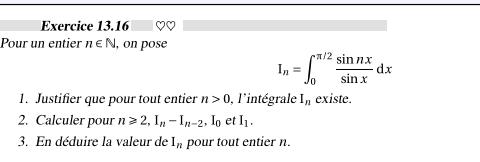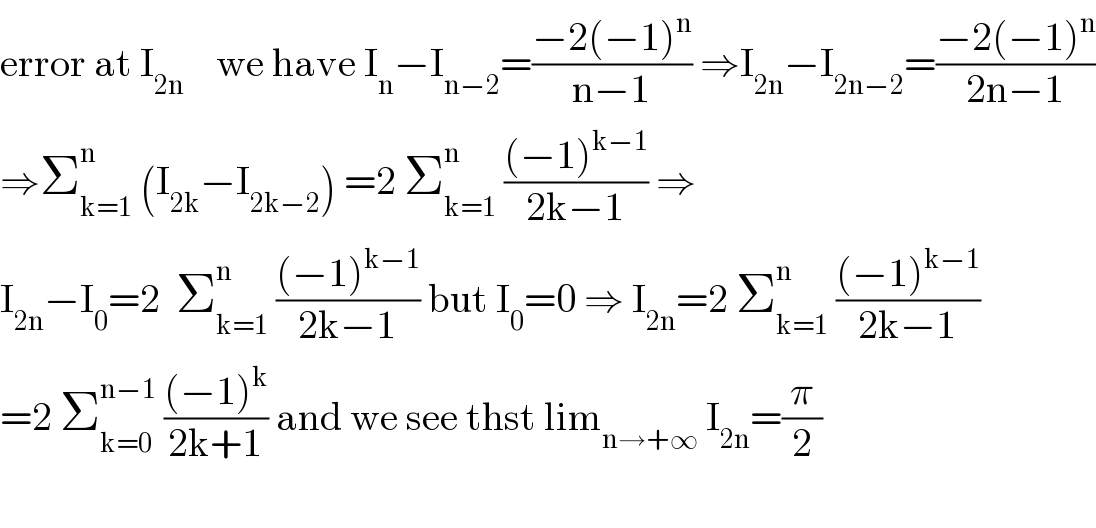
Question and Answers Forum
Question Number 100653 by Ar Brandon last updated on 28/Jun/20

Answered by mathmax by abdo last updated on 28/Jun/20
![1) f(x) =((sin(nx))/(sinx)) is continue on]0,(π/2)] ⇒ integrable at V(0) we have f(x)∼((nx)/x) =n so I_n exist 2)I_n −I_(n−2) =∫_0 ^(π/2) ((sin(nx)−sin(n−2)x)/(sinx))dx sinp −sinq =sinp +sin(−q) =cos((π/2)−p) +cos((π/2) +q) =2cos(((π−p+q)/2)) cos(((−p−q)/2)) =2cos((π/2)−((p−q)/2))cos(((p+q)/2)) =2cos(((p+q)/2))sin(((p−q)/2)) ⇒sin(nx)−sin(n−2)x =2 cos(((nx+nx−2x)/2))sin(((nx−nx+2x)/2)) =2cos(n−1)x sinx ⇒I_n −I_(n−2) =2∫_0 ^(π/2) cos(n−1)x dx =2[(1/(n−1))sin(n−1)x]_0 ^(π/2) =(2/(n−1))sin(n−1)(π/2) =(2/(n−1)) sin(((nπ)/2)−(π/2)) =−(2/(n−1))cos(((nπ)/2)) (n≥2) ⇒I_2 −I_0 =−(2/1)cos(π) =2 but I_0 =0 ⇒I_2 =2 3)we have I_n −I_(n−2) =−(2/(n−1)) cos(((nπ)/2)) ⇒I_(2n) −I_(2n−2) =−((2(−1)^n )/(n−1)) ⇒ Σ_(k=2) ^n (I_(2k) −I_(2k−2) ) =2 Σ_(k=2) ^n (((−1)^(k−1) )/(k−1)) ⇒ I_4 −I_2 +I_6 −I_4 +....I_(2n) −I_(2n−2) =2 Σ_(k=2) ^n (((−1)^(k−1) )/(k−1)) ⇒ I_(2n) =I_2 +2Σ_(k=2) ^n (((−1)^(k−1) )/(k−1)) =2 +2Σ_(k=1) ^(n−1) (((−1)^k )/k) I_(2n+1) −I_(2n−1) =−(2/(2n)) cos((((2n+1)π)/2)) =−(1/n)cos(nπ +(π/2)) =0 ⇒ I_(2n+1) =I_(2n−1) =I_1 =(π/2)](Q100662.png)
Commented by mathmax by abdo last updated on 28/Jun/20

Commented by Ar Brandon last updated on 28/Jun/20
Thank you Sir ��
